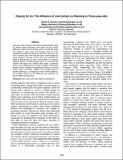Files in this item
Playing for us : the influence of joint action on planning in three-year-olds
Item metadata
| dc.contributor.author | Gerson, Sarah | |
| dc.contributor.author | Hunnius, Sabine | |
| dc.contributor.author | Bekkering, Harold | |
| dc.contributor.editor | Knauff, Markus | |
| dc.contributor.editor | Pauen, Michael | |
| dc.contributor.editor | Sebanz, Natalie | |
| dc.contributor.editor | Wachsmuth, Ipke | |
| dc.date.accessioned | 2015-03-09T10:01:02Z | |
| dc.date.available | 2015-03-09T10:01:02Z | |
| dc.date.issued | 2013 | |
| dc.identifier.citation | Gerson , S , Hunnius , S & Bekkering , H 2013 , Playing for us : the influence of joint action on planning in three-year-olds . in M Knauff , M Pauen , N Sebanz & I Wachsmuth (eds) , Proceedings of the 35th Annual Meeting of the Cognitive Science Society . Cognitive Science Society , 35th Annual Meeting of the Cognitive Science Society , Berlin , Germany , 31/07/13 . | en |
| dc.identifier.citation | conference | en |
| dc.identifier.isbn | 978-0-9768318-9-1 | |
| dc.identifier.other | PURE: 172717388 | |
| dc.identifier.other | PURE UUID: a2c03e4a-0ce7-46a6-ae9b-3e604f91a05d | |
| dc.identifier.uri | https://hdl.handle.net/10023/6194 | |
| dc.description | This work was funded by a Brain-and-Cognition-Excellence-Grant from NWO (433‐09‐253). | en |
| dc.description.abstract | Learning to plan sequences of actions and appropriately adapt our actions during interactions with others are both critical skills upon which much of human society is built. We know that children’s joint action and planning skills are both undergoing development during the preschool years, but not much is known about how the joint action context influences young children’s planning. In this study, we examined the effect of playing alone or with a joint partner on sequence planning during a problem-solving game in three-year-old children. We found that children were better at planning ahead in the individual than the joint condition of the game despite the joint condition requiring fewer actions on the part of the child. In contrast, children were equally good at problem-solving (i.e., correcting an error) in both conditions. The possible reasons for this difference and directions of future research are discussed. | |
| dc.language.iso | eng | |
| dc.publisher | Cognitive Science Society | |
| dc.relation.ispartof | Proceedings of the 35th Annual Meeting of the Cognitive Science Society | en |
| dc.rights | Copyright the Authors 2013. Permission to archive the paper granted by the authors and the publisher. | en |
| dc.subject | BF Psychology | en |
| dc.subject.lcc | BF | en |
| dc.title | Playing for us : the influence of joint action on planning in three-year-olds | en |
| dc.type | Conference item | en |
| dc.description.version | Publisher PDF | en |
| dc.contributor.institution | University of St Andrews. School of Psychology and Neuroscience | en |
This item appears in the following Collection(s)
Items in the St Andrews Research Repository are protected by copyright, with all rights reserved, unless otherwise indicated.

